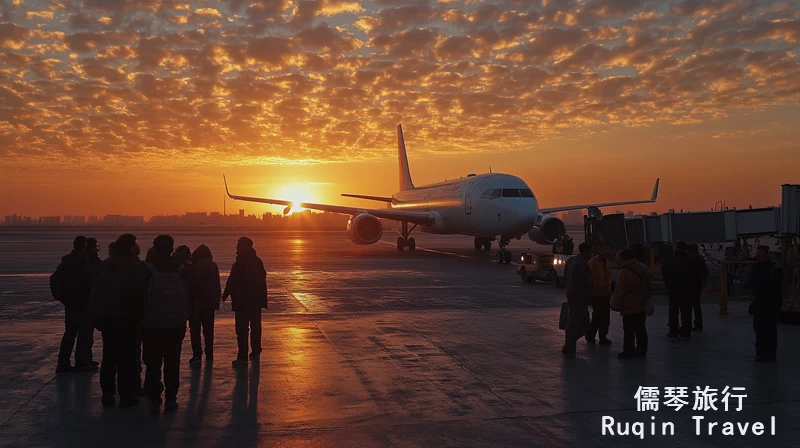Traveling by air is an efficient way to explore China. The vast country offers a range of domestic flights that can significantly reduce travel time. For foreign tourists, understanding the nuances of China’s domestic air travel system is crucial for a smooth journey. This “China Air Travel Guide” provides essential information on Chinese domestic airlines, airport procedures, and helpful tips to enhance your flying experience in China.
Overview of China’s Domestic Air Travel System
China’s domestic air travel system is well-developed and extensive. With over 200 airports and numerous airlines, it covers most major cities and regions. The main hubs include Beijing, Shanghai, and Guangzhou, which connect to various smaller cities. This network makes it convenient for tourists to reach even the more remote areas of the country.
Chinese domestic airlines, such as Air China, China Eastern, and China Southern, dominate the market. These airlines offer various classes, from economy to first class, catering to different budget levels. Furthermore, budget carriers like Spring Airlines provide affordable options for short-haul flights.
Booking Flights in China
Booking flights in China is straightforward. You can use online platforms like Trip.com, Fliggy, or directly through airline websites. Most websites support multiple languages, including English, making the process user-friendly. Additionally, you can book tickets through travel agencies or at the airport.
When booking, it’s advisable to do so in advance. This not only ensures better prices but also a wider selection of flights. However, if you’re traveling during peak seasons, such as Chinese New Year or National Day, book even earlier to avoid sold-out flights.
Navigating Chinese Airports
Chinese airports are generally modern and well-organized. Major airports like Beijing Capital International Airport and Shanghai Pudong International Airport are equipped with comprehensive facilities. Signs are usually bilingual, in Chinese and English, which helps foreign tourists navigate easily.
Airport Arrival and Check-In
First, arrive at the airport at least two hours before your domestic flight. This gives you enough time to check in and pass through security. Next, proceed to the check-in counter of your airline. You’ll need to present your passport and booking reference. The staff will issue your boarding pass and check your luggage. It’s important to note that Chinese domestic flights often have strict luggage policies. Generally, economy class passengers can check in up to 20 kg for free. However, this can vary by airline.
Security and Immigration
After check-in, head to the security checkpoint. In China, security procedures are stringent. Liquids exceeding 100 ml are not allowed in carry-on luggage. Additionally, electronic devices may need to be removed for screening. Foreign tourists should always carry their passport, as it’s required for identification at various checkpoints.
In-Flight Experience
The in-flight experience on Chinese domestic flights is generally comfortable. However, the level of service and amenities can vary between airlines and flight classes. Major airlines often provide complimentary meals and beverages, even on short flights. Budget airlines, on the other hand, may charge for in-flight services.
Language and Communication
Most flight attendants speak basic English, especially on major airlines. However, on budget carriers or smaller routes, English proficiency may be limited. It’s helpful to learn a few basic Mandarin phrases or use translation apps to communicate effectively.
Tips for Flying in China
To ensure a smooth flying experience in China, consider the following tips:
1. Arrive Early: Always arrive at the airport early to account for potential delays, especially during peak travel periods.
2. Understand Baggage Policies: Familiarize yourself with the baggage policies of your airline. Overweight baggage can result in hefty fees.
3. Keep Your Passport Handy: You’ll need your passport for identification at multiple points, including check-in and boarding.
4. Stay Informed About Flight Status: Use airline apps or airport displays to stay updated on flight status. Delays are not uncommon.
5. Prepare for Security Checks: Be ready for thorough security checks. Remove electronics and liquids from your carry-on bag.
6. Consider Travel Insurance: Travel insurance can provide peace of mind in case of flight cancellations or delays.
7. Plan for Limited In-Flight Entertainment: On some domestic flights, in-flight entertainment may be limited. Bring a book or download movies to your device.
Airport Procedures for Foreigners
Foreign tourists may encounter some differences in airport procedures compared to their home countries. Firstly, after arriving at the airport, foreigners must go through a special immigration channel. Present your passport and visa to the immigration officer. They may ask about your travel plans, so be prepared to provide details.
Customs Declaration
If you have items to declare, such as expensive electronics or large amounts of cash, fill out a customs declaration form. This is usually required if you are carrying items worth more than 5,000 RMB.
Health Declarations
In recent times, health declarations have become a standard procedure. You may need to fill out a health declaration form or show a health code on your mobile device. This is part of China’s effort to control the spread of diseases.
Domestic Air Travel Etiquette
When flying within China, being aware of local customs and etiquette can enhance your experience. Firstly, respect the boarding order. Passengers with young children, the elderly, and those needing assistance usually board first. Secondly, maintain cleanliness. Dispose of trash properly and keep your seat area tidy.
Additionally, while it’s common for announcements to be made in both Chinese and English, listening carefully can help you avoid confusion. Furthermore, it’s polite to thank the cabin crew upon deplaning, as a gesture of appreciation for their service.
Traveling by air in China offers convenience and efficiency, allowing tourists to explore the country’s vast and diverse landscapes. By understanding the domestic air travel system, booking procedures, airport protocols, and in-flight expectations, foreign tourists can enjoy a hassle-free experience.
To sum up, always plan ahead and familiarize yourself with the specific requirements of the airline you’re flying with. Additionally, keep essential travel documents handy and respect local customs. With this “China Air Travel Guide” , your journey across China will be smooth and enjoyable. Whether you’re heading to the bustling cities or the serene countryside, domestic flights are an excellent way to discover all that China has to offer. Check out China Survival Guide for more tips.



